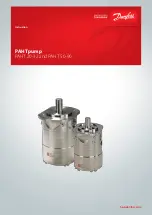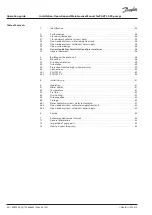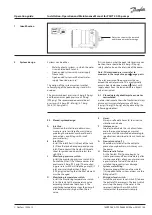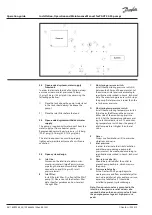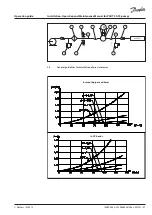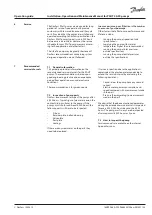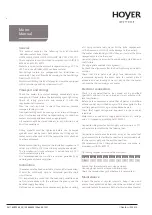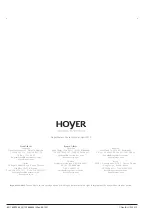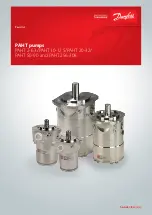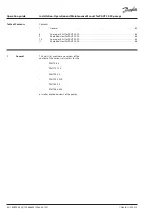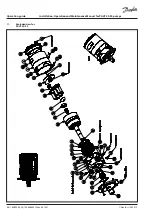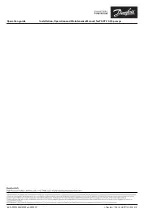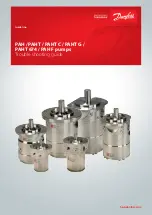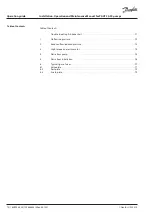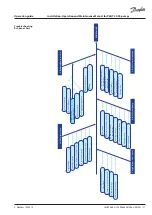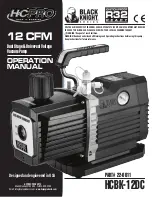
56 | 180R9288_AQ109686503100en-001301
© Danfoss | 2023.12
Operation guide
Installation, Operation and Maintenance Manual for PAHT 20-90 pumps
Motor
Manual
General
This manual concerns the following types of standard
induction motors from Hoyer:
HMA3, HMC3, HMA2, HMC2, HMD, HMT, MS, Y2E1, Y2E2, YDT
These motors are manufactured in accordance with IEC/EN
60034-4 and IEC/EN 60072.
Motors are rated for the ambient temperature range -20°C to
+40°C and site altitudes
≤
1000 m above sea level.
Low-voltage motors are components for installation in
machinery. They are CE marked according to the Low Voltage
Directive 2014/35/EU.
Motors not fulfilling the IE3 efficiency level must be equipped
with a variable speed drive when used in EU.
Transport and storage
Check the motor for external damage immediately upon
receipt and, if found, inform the forwarding agent right away.
Check all rating plate data, and compare it with the
requirement of the motor.
Turn the shaft by hand to check free rotation, remove
transport locking if used.
Transport locking must be used again for internal transport
also. It is also important that transport locking is used when
motors are transported mounted on equipment.
All motors should be stored indoors, in dry, vibration- and
dust-free conditions.
Lifting eyebolts must be tightened before use. Damaged
eyebolts must not be used, check before use. Lifting eyes at
motor must not be used to lift the motor when it is attached
to other equipment.
Before commissioning, measure the insulation impedance. If
values are
≤
10M
Ω
at 25°C, the winding must be oven dried.
The insulation resistance reference is halved for each 20°C
rise in motor temperature.
It is recommended that shafts are rotated periodically by
hand to prevent grease migration.
Installation
The motor must be fixed on a stable, clear and flat foundation.
It must be sufficiently rigid to withstand possible short
circuit forces.
It is important to ensure that the mounting conditions do
not cause resonance with the rotational frequency and the
doubled supply frequency.
Only mount or remove drive components (pulley, coupling,
etc.) using suitable tools, never hit the drive components
with a hammer as this will cause damage to the bearing.
The motor are balancing with half key, ensure that the drive
components are also the same.
Correct alignment is essential to avoid bearing, vibration and
shaft failure.
Use appropriate methods for alignment.
Re-check the alignment after the final tightening of the bolts
or studs.
Check that drain holes and plugs face downwards. We
recommend opening the drain hole for motors placed
outdoors and not running 24 hours / day, so that the motor
can breathe, thus ensuring a dry motor.
Electrical connection
Work is only permitted to be carried out by qualified
specialists and must to be carried out in accordance with
local regulations.
Before work commences, ensure that all power is switched
off and cannot be switched on again. This also applies to the
auxiliary power circuits, e.g. anti-condense heaters.
Check that supply voltage and frequency are the same as
rated data.
Motors can be used with a supply deviation of ± 5% voltage
and ± 2% frequency, according to IEC60034-1.
Connection diagrams for main supply and accessory as PTC
or heater are located inside the terminal box.
Connections must be made in such a way as to ensure that
a permanently safe electrical connection is maintained, both
for the main supply and the earth connection.
We recommend that crimped connections are made in
accordance with IEC 60352-2.
Tightening torques for terminal board screws:
Thread
M5
M6
M8
M10
M12
M16
M20
M24
T.(Nm)
2.5
3.5
7
12
18
35
55
80
Ensure that the terminal box is clean and dry.
Unused glands must be closed with blind caps.
Check the terminal box gasket before it is remounted.
Maintenance
Inspect the motor at regular intervals, keep it clean and
ensure free ventilation air flow, check the condition of shaft
seals and replace if necessary. Both electrical and mechanical


